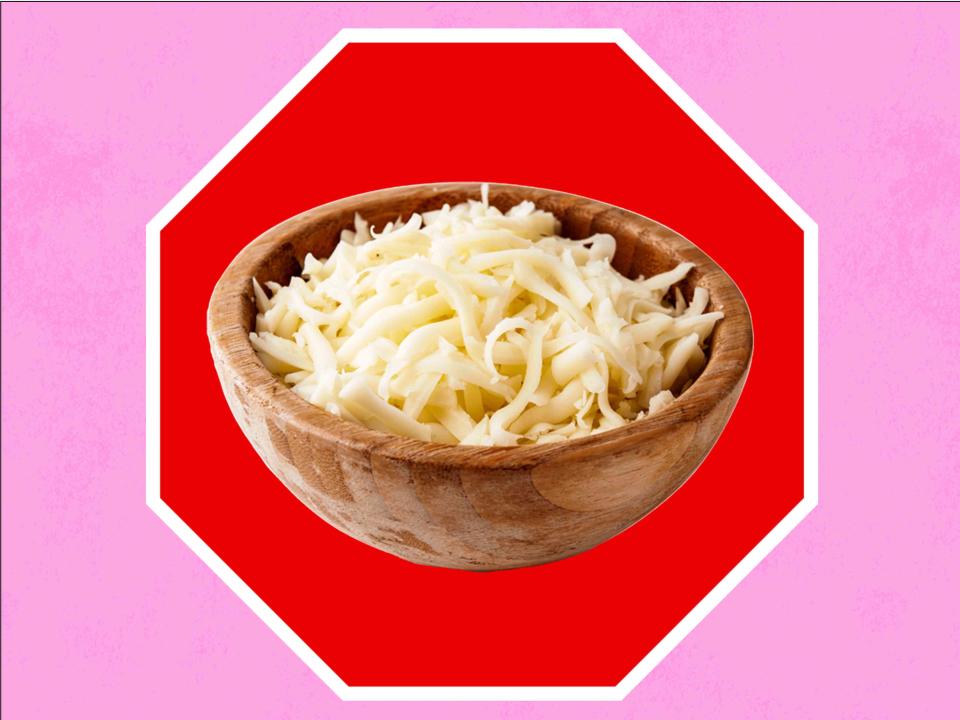TikTok Was Wrong—Stop Doing This 'Detestable' Hack To Shredded Cheese
The internet is divided over this hack, but we're not.

Getty Images
You know it’s important to properly wash fruits and veggies and that you should not rinse meat (except in this one instance), but have you heard that some people are washing store-bought shredded cheese? We've seen this "hack" all over our social media feeds, so we decided to do a little digging on the trend.
Where Did the Shredded Cheese-Washing Trend Originate?
The eyebrow-raising idea first came on the social media scene when TikTok creators @janelleandkate shared the cheese-washing tip on their page in February 2024.
“Have you heard of washing shredded cheese?,” the mother and daughter duo asks in the video. “This is the best kitchen hack ever; saves you time from having to shred your own cheese.”
The video shows the host opening a bag of pre-shredded cheese and pouring it into a mesh colander. She stands the colander on top of a large bowl and pours water over the shredded cheese. Janelle’s mom explains that she is rinsing the anti-caking agents off of the cheese pieces that manufacturers add to the product as a way to keep the cheese from sticking together in the package.
With clean hands, she tosses the “washed” cheese in the colander, and what is left behind is a bowl of cloudy water. “Oh wow! This is why you have to wash your cheese!” she says.
Their cheese washing video has racked up nearly 1 million views and 1,200 comments from viewers who have thoughts on the cheese-washing hack. Feedback ranges from amazement at the mere suggestion of washing cheese to critiques about the resulting damp dairy product.
“And now I have wet cheese?,” says one commenter who is not impressed with the meal prep suggestion. “No thanks.”
Should You Wash Store-Bought Shredded Cheese?
The idea behind washing shredded cheese from the supermarket is to remove any anti-caking ingredients—essentially cellulose—which are added in very small amounts to absorb excess moisture, thereby preventing cheese pieces from clumping.
Anti-caking agents are safe to consume, though some people may experience some gastrointestinal symptoms from consuming them. And while they keep shredded cheese from sticking together, they can also make the act of melting store-bought shredded cheese more difficult or cause sauces to break. So is a simple rinse the best way to combat these cheesy conundrums?
We took this question to the Allrecipes test kitchen pros, and the answer was clear—and emphatic. "I find this 'trick' to be...detestable," says Julia Levy, recipe tester and developer. "That's a bit harsh, but I hate it," she says.
Our test kitchen highly recommends skipping the rinse cycle and grabbing a block of cheese to grate at home when you can. This will ensure that you get the freshest ingredient, whether you're using it to sprinkle over salads, soups, or dips—or using it to make a velvety cheese sauce or the creamiest mac and cheese ever.
Another benefit of grating your own cheese? You will save a bit of Cheddar as far as your wallet is concerned, since bags of pre-shredded cheese typically cost more.
While grating your own is our number one pick, we know convenience is key on so many occasions, which means purchasing packages of shredded cheese is also an excellent option. In this case, our test kitchen experts recommend opting for higher-quality shredded cheese or ones with larger shreds, as opposed to the finer shredded cheeses.
If you are concerned about anti-caking ingredients for dietary concerns, you can try the washing method, but it’s not a necessary step otherwise. If you have an averse reaction to these agents, you're probably better off shredding your own cheese from a block anyways.
If you do choose to rinse your shredded cheese, put the cheese for your recipe into a colander, and give it a light rinse under cool running water. Dry the shreds of cheese with a clean towel to remove as much excess water as possible before using in your recipe and only do so right before you're going to use it for food safety reasons.
To rinse or not to rinse, that is the question. Our answer: it's definitely not necessary. As always, don't believe everything you see the internet!
Read the original article on All Recipes.

